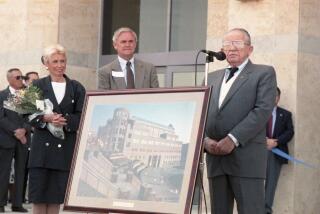Curran Should Let History Be the Judge
- Share via
It is not difficult to find defenders of Father Charles Curran, the Catholic University professor from whom the Vatican has withdrawn its license to teach Roman Catholic theology. Whether the issue is couched in terms of moral rules for sex (on which Curran dissents in modest ways from Catholic teaching) or in terms of freedom versus authority, polls show that most Americans hold positions closer to Curran’s than to the Pope’s.
Charles Curran, as man and priest, is a sympathetic figure--moderate, serious and determined. Nonetheless, the judgment of the church is correct in this instance.
Curran has compared himself to American Jesuit John Courtney Murray, who was asked by the Vatican in the late 1940s not to publish further on religious liberty in America--a position then contrary to official Catholic teaching. Within 20 years, however, Murray’s “dissent” became, at the Second Vatican Council (1962-65), the official Catholic view. This clear instance of development in Catholic teaching is Curran’s main line of defense. Theologians, he rightly says, must push and probe. “I remain convinced,” he told a press conference, “that the hierarchical teaching office in the Roman Catholic Church must allow dissent on these issues (divorce, abortion, homosexuality, etc.) and ultimately should change its teaching.” He believes that he has blazed a trail for the future.
Yet if Curran is confident about his ultimate correctness, why doesn’t he do what Murray did? Murray called no press conferences. Murray heeded the Vatican, kept silence and continued his creative work in new fields. Why doesn’t Curran allow history to decide?
Here a second irony emerges. Murray’s great achievement was to effectively take the state out of the church’s business. Religious liberty frees church and state from mutual entanglement. But Curran is contemplating taking his case to the civil courts. This would bring the state back into entanglement with religion.
It is not insignificant that Curran is not only a professor but also a priest. He is in that respect a church official. In addition, he has the rare privilege of teaching in a “pontifical” department of theology, with a special license from the Vatican to represent the pontiff in the field of moral theology. This is the license that the Vatican has now withdrawn.
The Vatican has not excommunicated Curran, or asked him to keep silence, or forbidden him to teach in Catholic institutions. But John Paul II is saying that Curran no longer speaks for him.
Curran next asserts that it is important for him to fight for the right of Catholic priests and lay theologians to voice their dissents publicly. Particularly, he says, they should be able to do so in matters of morals that are part of the “ordinary” teaching of the church, such as most sexual matters, on which the church has never ruled in a solemn, infallible way.
But this argument has two flaws:
--It is essentially an argument of laissez faire for theologians. Curran, like most theologians, repudiates such an argument when made by economists. It is hard to see how they can claim it in such pure form for theologians.
--It runs counter to the common good of the Catholic people. Holding to strict observance of Catholic teaching on divorce, abortion, birth control, homosexuality and premarital sex is very difficult. Those who do so feel undermined when theologians speculate that their efforts may not be necessary. John Paul II is coming to the support of such Catholics by saying that they are correct.
The problem is that, until the present generation, theologians could write solely for other theologians, without much notice of their work in the public press. Their free-wheeling speculations were known mostly to professionals. Nowadays such speculations swiftly become public knowledge. Ordinary lay Catholics are making fateful decisions every day. No one can be half-pregnant, or half-aborted.
Catholic people (and the general public) need urgently to know what official Catholic teaching is, with all its reasoning. True enough, theologians often need room to explore, probe and experiment. An unsolved problem of our generation is how to do this outside the glare of publicity. Those, like Curran, working to affect the future actually have as their primary target the guardians of clear and true doctrines in the church, the hierarchy. This is a relatively small number of persons. Whipping up popular sentiment to stampede them is likely to backfire. Murray showed how effectively the task can be accomplished.
If he trusts the test of the future, I hope that Curran will show the wisdom--and the ultimate confidence--to do the same.
More to Read
Sign up for Essential California
The most important California stories and recommendations in your inbox every morning.
You may occasionally receive promotional content from the Los Angeles Times.













